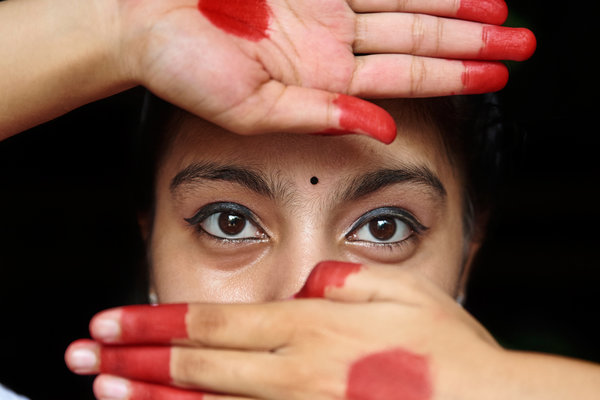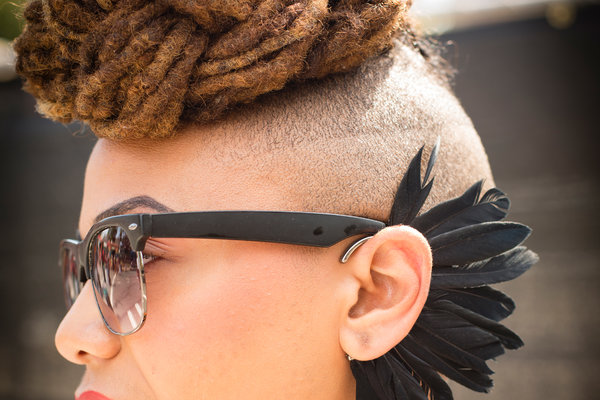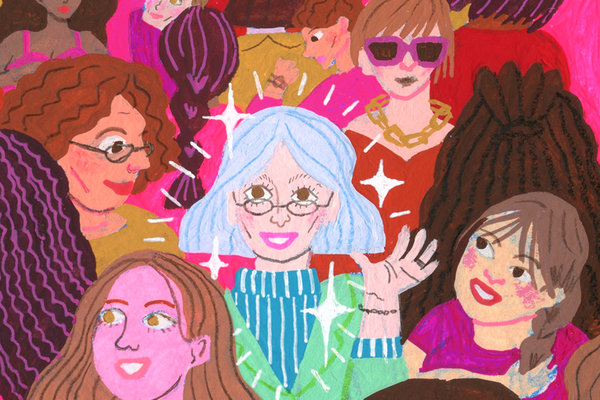I should have been at summer camp. Instead, I was sitting in a hair salon with my mom, grandmother and a hairdresser named James Brown (the perfect name for a hairdresser who tapped into the soul of his clients).
As happy campers go, I was not one of them.
“Can’t I just stay home?” I asked my mom when I told her I absolutely, positively did not want to go to squash camp that day. That idea was quickly nixed, and she loaded me and my book into the back seat of the car.
Every Thursday for as long as I could remember, my mom and grandmother drove 25 minutes into the Center City section of Philadelphia to get their hair done. The day I went with them, I sat in the corner and half-watched, half-read until I became transfixed by the scene in front of me: wash, blow-dry, flat iron, repeat.
James straightened their hair, but he also inadvertently straightened out their lives and what was happening in the world. I watched the three of them unpack the universe. When he was finished, they were radiant, from the outside-in and back out again.
I grew up knowing that beauty comes at a price. I also grew up watching women pay that price for more than superficial reasons — it wasn’t just about looking good but how it made them feel. To me, hair and relationships have always been tangled together.
When I was younger, my grandmother did my hair every day before school. I imagine in heaven there is someone combing your hair and scratching your scalp. For 30 minutes, her fingers worked their way through my hair, brushing and combing and braiding while I sat in a rocking chair, she on the tan striped sofa, the news playing in the background.
She talked to me about life’s most important matters, subjects I wouldn’t learn in school, like how to grow the perfect garden or what I really felt when reading “Their Eyes Were Watching God.” My hair looked and felt nothing like most of my classmates’, and she made me feel seen in those early hours, perhaps when it mattered most.
[Want more coverage of race and gender? Sign up for Gender Letter, a weekly newsletter focused on women, or Race/Related, a newsletter that tackles race and identity.]
Black women have intimate and sometimes fraught relationships with our hair. We have to manage not only how we feel about it, but also how it makes others feel. Black news anchors, for instance, were historically told to straighten their hair if they wanted to get a job. Our hair becomes so much a part of who we are that the routines surrounding it similarly are part and parcel of how we define ourselves.
That day in the salon I realized I wasn’t the only one who felt like her hair was a conduit for feeling like you fit in the world. My mom and grandmother went downtown every week because it was an escape from the demands their world placed on them and a chance to feel seen.
Not long after, I asked my mom and grandmother if I too could get my hair done. They acquiesced (although I wouldn’t go every week), and with that I entered a new era of womanhood in my family, ushered into a routine that helped us bond on a deeper level. On the days when all three of us went together we treated ourselves to lunch afterward — fresh hair can’t be wasted by going straight home.
As ridiculous as it seems now, I thought my hair (and, more important, the taming of my hair) was one of the reasons I had friends. When you’re different from most of the people around you, you can either embrace your difference or conform.
I chose to conform by making my hair look like everyone else’s. Girls put ribbons in their hair, so I put ribbons in my hair. Girls wore their hair half up, half down, so I made my grandmother run the curling iron through a few extra times.
My hair was a tangible thing I could control while I tried to ignore the other reasons I felt like a misfit. And the more I controlled it, the more compliments I got. “So this must work,” I thought.
Eventually I graduated from straight blowouts to more painful chemical relaxers, a jump that my mom and grandmother never made. But, I reasoned, it would help me feel beautiful for longer with less of the daily work. I imagined the compliments flowing. I imagined the friction I felt from the realities of race and how those realities manifested themselves in my hair disappearing.
“You’re sure?” my mom asked. I was.
A relaxer is a painful affair made more painful by the fact that the pain signals its effectiveness. First, the white liquid is battered onto sections of your scalp. Then it’s pulled through strands of your hair. When it starts to burn, you know it’s working. The longer you can withstand the needles, the longer the relaxer will last once it is washed out.
Relaxers work, but part of the reason they work is their ability to make women dependent on them. They get to the root of the problem — meaning that when you sweat, your hair actually stays manageable. Relaxers wear off slowly and then all at once, until you’re staring at yourself in the mirror after a hot summer day and frantically making your next appointment.
I’m 32, and since that first day in the salon I’ve spent roughly $18,000 on straightening treatments to look like a version of myself that makes me feel more at home in the world and in my body.
Up until a few months ago, I straightened my hair every day. I straightened it, mostly, to try and mimic the feeling James Brown gave me and the women in my family — to show up at work with the same feeling that I used to have showing up at school after a hair appointment: comfortable and radiant, so I wouldn’t be bothered to think about my hair at all.
Recently though, I stopped straightening my hair. In some way, this small act that millions of women opt for every day, makes me feel closer to my grandmother, who died a decade ago, as if I’m just waiting for her to sit on the tan striped sofa with the news playing in the background.
Most women at some point have to grapple with the relationship they want to have with their hair. Do they want to use it to make a statement or have the least maintenance possible? How prepared and put together do they feel if their hair isn’t done? Hair is one of the defining pieces that influences how a woman feels when she enters the room, whether that’s comfortable to admit or not.
For black women, especially, hair is a work of art. Finding the hairstyle that makes you feel both seen and comfortable is a quest that almost every woman embarks on at some point.
My journey began that day in the salon.
Today, my hair is helping me work out the most important relationship I’ll ever have: the one I have with myself.
Maura Cheeks is writing a book about the intersection of race, gender and corporate spaces.
Rites of Passage is a project of Styles and The Times Gender Initiative. For information on how to submit an essay, click here.










